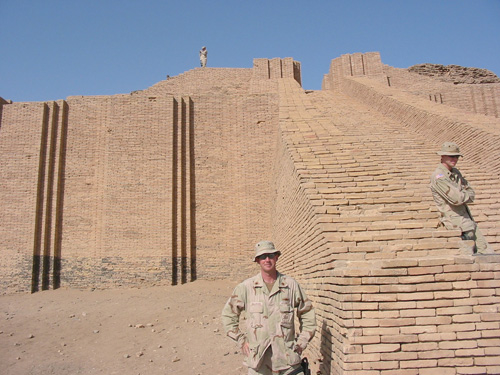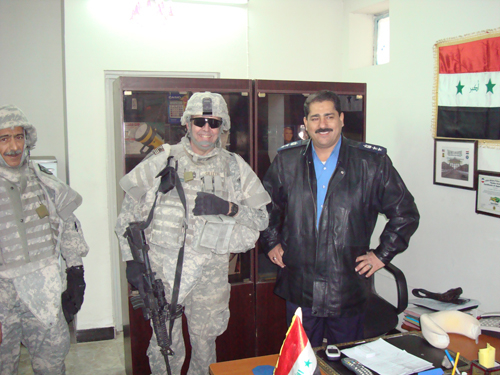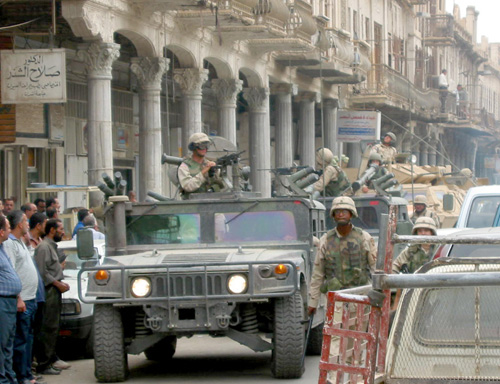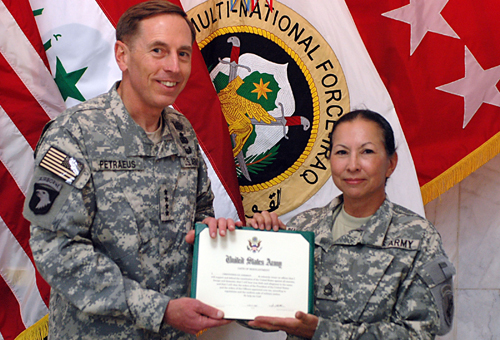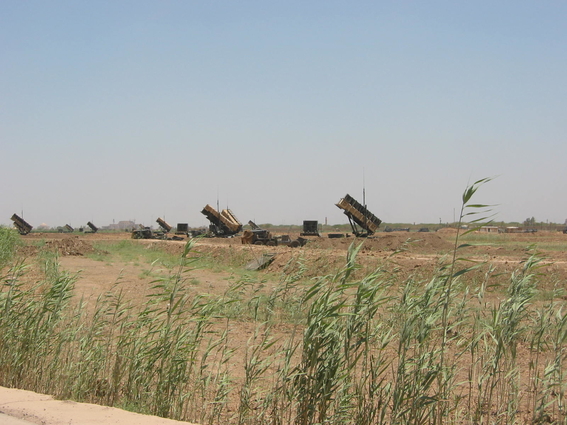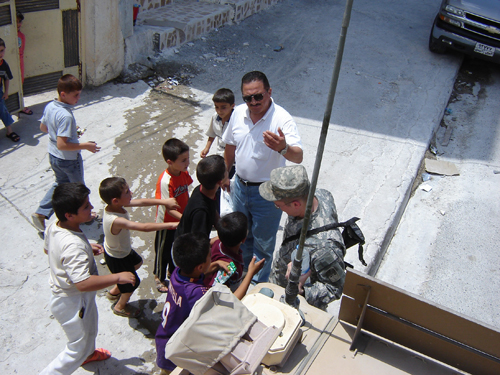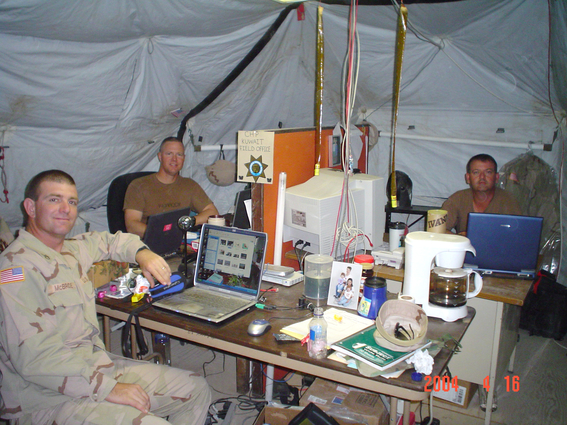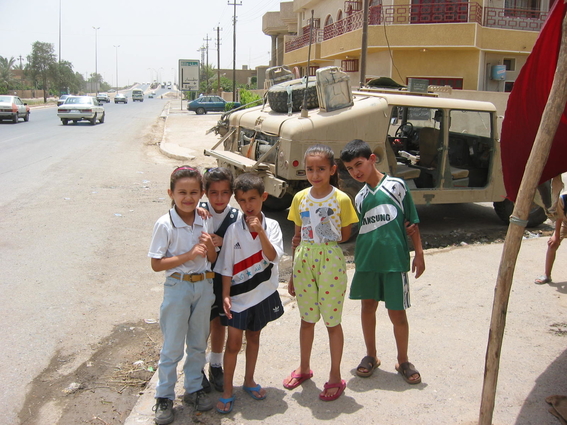Part Two: Serving in Iraq
(Editor's note: This is the second and concluding article in the two-part series paying tribute to the more than 45 Laboratory employees who have served in the military in Afghanistan, Iraq and other hot spots. The first article ran in the Friday, July 17 edition of Newsline. )
Even though one served in Iraq and one served in Kuwait for the Iraq War, Lab employees Lee Gillette and Michael Harland came to the same conclusion: America's young soldiers do a first-class job.
Now a retired U.S. Army reservist, Gillette was voluntarily recalled to active duty about two years ago to serve with a military police company in Baghdad, working in the city's eastern sector three miles south of Sadr City.
He was deployed to Forward Operating Base (FOB) Rustamiyah and served from May 2007 to May 2008.
"I went back into the military at my age (51) because I felt I had not done enough," said Gillette, who works in the LLNL Security Organization. "The war wasn't over and it was my duty as a soldier to go. There were only two other soldiers older than 40 in my company.
"I loved every one of those kids. They went out day after day and did their job. Some were wounded and most took near misses from improvised explosive devices (IEDs), small arms fire and indirect fire. I remember after one real bad rocket attack, a young sergeant walked up to me and stated, 'Now that was a rocket attack.' He laughed and walked off. What guts! I saw this every day. A day does not go by where I don't think about all those fine young men and women with whom I served."
Gillette recalls Sadr City as a "real active" place during his time there. "Our little base got mortared or shelled nearly every day for several months. There also were loads of IEDs in our area."
Harland, a chemical technician for the Physical and Life Sciences Directorate, served from November 2003 to December 2004 in Ash Shyuabah, Kuwait.
Harland was a boat coxswain/patrol leader, directing 27-foot patrol boats with four-man crews as they provided force protection and escorted large supply ships in the Persian Gulf. He held full weapons release authority.
"I never felt more alive than when I was there," Harland said. "I did my time and I did my duty for my country. I saw some amazing things while I was over there. I was very impressed with the quality of the younger generation of military personnel.
"Today's younger military personnel are dedicated individuals; they follow orders, and they really work to fulfill their missions. Their dedication and commitment are what really impressed me," Harland added.
After 28 years total service in the U.S. Navy, including 15 years on active duty as a radioman first class, Harland retired in April 2005.
Still on duty in Iraq
Even today, at least five or six Laboratory employees remain on active duty in Iraq.
One is Staff Sgt. James Vickers, who is a medic in the U.S. Army Reserves and who is serving at Camp Taji, northwest of Baghdad. Vickers will be in Iraq through September of this year.
At the Laboratory, he works as a senior laser technologist in the Laser Engineering Division for the National Ignition Facility.
"I take great pride in helping to protect the American people and this mission has been a rewarding one, since I am helping another country turn the corner and become a democratic society," Vickers said.
Lab employee and Sgt. First Class Deborah Lawson, who works in Plant Engineering's Instrument Shop, is now concluding her second tour in Iraq.
During her first tour, Lawson served in Iraq with the 2668th Transportation Company, delivering supplies for six months and performing convoy security for six months. Her first stay lasted from October 2004 through December 2005.
Lawson, who serves in the U.S. Army Reserves, started her current tour in October 2008 and has been located at Camp Speicher near Tikrit. Another Lab employee — Staff Sgt. Les Basilio — is stationed at the same base as Lawson.
"I'd like to say one thing: The Instrument Shop and Plant Engineering are very patriotic and supportive of their military personnel. We couldn't do it without them," he added.
In mid-July, Lawson wrote that Iraq's temperatures have been high (between 110 and 120 degrees Fahrenheit) this summer, but that the heat hasn't been the most bothersome aspect. "It's the constant sandstorms," she said. "They are partly due to the droughts of the last few years, but it is worse this year than ever before in many locals' memories."
Lawson, who plans to be back in the states by early September, said: "We can look back on the last year and know that we did a good job and worked well together as a team. What a big difference the U.S. and coalition forces have made for the Iraqi people."
Sgt. First Class Joseph Smith of the Lab's Security Organization is now "pulling duty" with his second tour in Iraq.
Initially, Smith served in Baghdad from February 2006 to May 2007. A member of the U.S. Army Reserves, Civil Affairs, he has been serving in Maysan from August 2008 to the current time.
"Over the last three years, I have been able to witness first-hand the gains that the American military is making in Iraq," Smith said. "I'll be glad when it's all done, but for myself, I think we are making huge changes in the Middle East. I'm interested to see how things turn out over the next 15-20 years."
Reserves are like a second career
Two Lab employees, among the many who serve in the military reserves, are Brian Cracchiola and Karl Schirrmacher, who called working a job in civilian life and serving in the reserves something like having two careers.
Cracchiola, who works for B Division as the firing operations supervisor for the High Explosives Applications Facility, served in Iraq from 2004-2005 outside Baghdad at a small military facility.
"My management has been beyond accommodating with my service and was supportive of my decision to become a commissioned officer," Cracchiola said. "The reality is that many reservists, especially those who work at the Lab, have exploitable skills that the combat commanders desire. Oftentimes, it is a juggling act between our civilian careers and our commitment to serving our nation."
The work Cracchiola did in Iraq, he said, was for the children of Iraq, his daughter, and for their future.
He recalls one hot August day near Balad, Iraq, when the temperature was in the range of 120 degrees Fahrenheit, and he was riding at the end of a Humvee convoy. A seven or eight-year-old boy came running down a side road of dirt and rocks in bare feet as he waved to the convoy's last vehicles and gave them a thumbs-up sign.
Schirrmacher, of the Lab's Security Organization, served in Baghdad from January 2004 to March 2005 during his first tour and now is on duty in Mosul through November 2009 for his second tour. He is part of the U.S. Army Reserves, Civil Affairs.
"It's a pleasure and honor to be able to serve in the military, but we can't do it without supportive employers, friends and especially family," Schirrmacher said. "Being in the reserve component is tougher than active duty, as you have to live two lives, and you never know when you have to go from one side to the other.
"Between schools, deployments and the regular tasks to keep a reserve unit moving, it takes considerable time and effort to maintain that second career. We could not do it without the support we get from those around us."
Enlisting on the grand scale
Lab employee Dianne Buckhout, an administrative assistant in the Operations and Business Principal Directorate, enlisted in the U.S. Army Reserve on July 4, 2007, at Al Faw Palace in Baghdad.
She re-enlisted in a ceremony with 628 other soldiers and 161 soldiers who were sworn in to become naturalized U.S. citizens. It was the largest military re-enlistment ceremony in American history.
Surrounded by soldiers, American civilians and Iraqis, Buckhout recalled: "It was one of those lung-filling, heart-swelling emotional moments as the full meaning of Independence Day struck like never before, maybe because the risks and rewards were so clearly written in the eyes of my fellow soldiers."
Buckhout served two tours in Iraq. During her first stay, from November 2003 to January 2004, she was at Camp Sather at Saddam International Airport, staging casualties for medical evacuation to Landstuhl, Germany. Her second tour ran from January 2007 to February 2008 at Camp Victory.
"Serving in Iraq was an incredible life experience," Buckhout said. "I saw things I would never have seen and met people I would never have normally met. During this tour of duty, we observed a country go from a war zone with more than 1,000 attacks per day to less than 50 countrywide, with families moving back into their homes in Baghdad and reopening their businesses.
"I asked them what they thought of us. They told me they were grateful that Saddam and his regime were taken out of power. They hated the foreign radicals who came into their country and used IEDs and suicide bombs without regard to innocent Iraqis. They do want us to leave, but everyone I spoke to said, 'don't leave yet, we still need you.'"
Recipients of Purple Hearts
In 2007, two young U.S. Army veterans who had served in Iraq — and sustained severe injuries and received Purple Hearts for their valor — joined the Laboratory as employees through the Livermore Sentinels of Freedom Scholarship Program.
They were U.S. Army Sgt. Cristian Valle and U.S. Army Private First Class Justin Leon.
Valle, who joined the Lab as an emergency dispatcher trainee and now works for the Alameda County Fire Department, served two tours in Iraq. His first tour lasted from March to August 2003 and his second, centered in Balad, ran from January to October 2005.
During his second tour, Valle was driving a vehicle during a routine patrol in Balad when he exited his vehicle and walked to the side of the road. A car passed with four terrorists. They threw an IED that rolled alongside the truck in his direction, exploded and knocked him to the door.
Because of the explosion, Valle lost both his legs. He was eventually brought to Walter Reed Army Medical Center, where he underwent additional surgeries and more than a year of rehabilitation. Today, he moves about with the aid of prosthetic legs.
"It was fun (being in the military) while it lasted," Valle said. "I don't regret a thing. And if I could, I would still be serving in the military."
Leon, who is a property center representative in the Operations and Business Principal Directorate, was based at Kirkuk and served for a year from December 2004 to December 2005.
During a combat operation, Leon was serving as a gunner on top of a vehicle when the vehicle struck an IED. Leon was pinned underneath the vehicle and lost his right arm. Like Valle, he eventually went to Walter Reed Army Medical Center for a lengthy rehabilitation.
"After all that I have gone through, I would not change a thing," Leon said. "I am a much better and more confident person."
Other Lab employees who have served in Iraq:
Victor Giacalone
Victor Giacalone of the Laboratory's Security Organization served for a year in Baghdad, starting in 2004.
Giacalone, who was a member of the U.S. Army National Guard, oversaw security at checkpoints, patrolled areas and participated in convoy missions surrounding the Iraqi capital's Green Zone.
"I always had a desire to serve, but I didn't want to serve without a purpose," Giacalone said. "After 9/11, I knew it was my time. I was in my mid-30s and I knew what I was getting into. I have no regrets about my service."
Randy Misa
Randy Misa is an electrician in the Laboratory's Maintenance and Utility Services Department.
As a member of the U.S. Navy Reserves, Misa did much the same work in Iraq, as he served from January to November of 2004. He worked as an electrician at Camp Anaconda in Balad, installing wiring and inspecting electrical facilities and power plants.
"I like helping people, so my time in Iraq was a rewarding experience," Misa said.
Craig Pryor
Lab employee Craig Pryor served as an aircraft maintenance supervisor in Irbil and Kirkuk, Iraq from about April to November 2003. As a member of the U.S. Army National Guard, Pryor supervised the maintenance of CH-47D Chinook helicopters.
Pryor works at LLNL as a senior mechanical technologist in the Defense Technologies Engineering Division.
Joshua Fritz
Joshua Fritz of the Laboratory's Security Organization served in Iraq with the U.S. Marine Corps from January to June 2003.
"I think the United States did and is still doing a great thing for the country of Iraq," Fritz said. "Taking Saddam out of power was in the best interest of the whole world. I'm glad and proud of my service in the Marine Corps and in Iraq."
Adam White
Lab employee Adam White deployed to Iraq with the U.S. Air Force for four months in 2006, serving at Balad Air Base, north of Baghdad. In that post, he supervised and supported the avionics system readiness of close support aircraft.
"I'm proud to have served," White said. "My role was on base most of the time, which was a relatively cushy place to be. Other than occasional mortars and small arms fire, we really weren't in harm's way — parts of some U.S. cities are probably more dangerous.
"My job enabled close air support for ground troops in need of it. Those troops were in no uncertain terms in harm's way; they deserve our thanks, and I'm glad to have been able to help them."
Today, at the Laboratory, White works on pulsed power systems as an electrical engineer in the National Security Engineering Division.
Joshua Calderon
Through the U.S. Army Reserves, Joshua Calderon was on assignment in Iraq from September 2005 to September 2006, serving out of Camp Victory in Baghdad and Logistic Service Area Diamondback in Mosul.
"Part of my mission was to gather information that was used to improve the quality of life for the everyday Iraqi citizen, such as through electricity, water, security and so on," said Calderon, who works in the LLNL Security Organization.
"I thought my deployment was a great opportunity. I was able to learn new skills and hone skills I already had. At times during the pre-deployment and post deployment phases to Iraq, I thought things were unorganized and chaotic. However, somehow the job got done.
"I believe before, during and after my mobilization that many Americans understood and understand what we are doing, why we are there, and why it is important to succeed. Granted, what we all know what we read in magazines or watch on television, are mostly at odds with each other," Calderon said.
Ulysses Allen
Lab employee Ulysses Allen was deployed to Iraq for a year from January 2005 to January 2006 with the U.S. Army and stationed at Forward Operating Base Falcon, about five to 10 miles south of Baghdad.
Allen and his fellow soldiers transported prisoners and often manned observation posts, where they attempted to detect and find the location of individuals who launched mortars into the Green Zone in Baghdad.
"We would bake when it was hot and freeze when it was cold," Allen said, recalling that on hot days the soldiers would bring frozen bottles of water that would quickly melt in the heat.
"The dust storms in Iraq are totally unreal," Allen recalled. "The sky becomes orange. The vehicles become covered. I've never seen anything like that in my life apart from Iraq.
"At times, it felt pretty good helping people. At other times, it seemed fairly hopeless (in the period before the surge)," he said.
Jason McCall
Their mission was to help secure Baghdad and they advanced along Route 7, moving on the path of the Iraqi cities of Basra and An Nasiriyah. Jason McCall, who is with the Laboratory's Security Organization, called the initial advance into Iraq "exciting and nerve-wracking." He served in Iraq from February through June 2003.
"Being in the military makes you realize how lucky we are to be Americans and to serve with men and women who are willing to pay the ultimate price for the person fighting to their left and right," McCall said. "It also feels great to know that other Americans at home are supporting you, and depending on you."
James Akers
Lab employee James Akers was deployed to Iraq with the U.S. Army Reserves, through the 319th Signal Battalion based in Sacramento, from January to July 2004. He was stationed at Coalition Headquarters in Basra.
Akers and his fellow soldiers designed, installed and maintained voice and data communications throughout much of Iraq. They established phone lines, computer lines and satellite links for four forward operating bases.
"Our time in Iraq gave us the opportunity to finally do what we had been trained to do for years," Akers said. "It was a real world mission. It was very exciting. We always appreciated being able to establish reliable communications in the middle of the desert because at that time, you couldn't just pick up a cell phone and call.
"Serving in the U.S. military has been the greatest adventure of my life. The places I have traveled to, the friends I have made and the people I have met along the way have contributed greatly in making me the person I am today," Akers noted. "I am truly grateful."
Akers also expressed gratitude for the assistance that the American people provided to U.S. military personnel in Iraq.
"The support we received from the states was incredible. We received letters, along with cards from schools and children." Some of the items sent to the troops included coffee, cookies, tuna and chicken pouches and wet wipes, which Akers said "were like gold."
At the Laboratory, Akers is a field operations supervisor in the Radioactive and Hazardous Waste Division of the Operations and Business Principal Directorate.
Jason Calhoun
Jason Calhoun of the Laboratory's Security Organization served in Iraq during the first months of the war, deploying from May to November 2003 with the U.S. Army.
He was stationed at Tallil Air Base, southeast of Baghdad near the city of An Nasiriyah. Calhoun and his fellow soldiers provided convoy escort and route reconnaissance as part of their mission.
Pete Tirapelle
Lab employee Pete Tirapelle was on active duty in the U.S. Army from 1972-1974. Two years later, in 1976, he joined the U.S. Army Reserves, and he's been in the reserves ever since — for the past 33 years.
In 2004, at the age of 52, Tirapelle was recalled to active duty and he deployed to Balad, Iraq, where he served from March 2004 to April 2005 as the command sergeant major of the 6/52 Aviation Regiment, which is based in Los Alamitos, Calif.
Command sergeant majors are the highest non-commissioned officers in the Army and act as the senior enlisted adviser to battalion commanders, providing input from soldiers on health, welfare, family and even food issues.
At Balad, Tirapelle's pilots flew fixed wing aircraft — C-23 Sherpa planes, UC-35 planes similar to Lear jets and C-12 planes similar to Citation turboprops — that mainly ferried military personnel, but also hauled airplane and helicopter parts, food, and medical supplies from the top to the bottom of Iraq.
During his regiment's year in Iraq, Tirapelle's pilots flew three times as many air miles as the previous regiment that had been stationed at Balad. When they returned home, they received the U.S. Army's Quad-A award for excellence.
Tirapelle works as a mechanical designer in the Engineering's Technology Resources Engineering Division.
Marc Carlson
Marc Carlson of the Laboratory's Security Organization was deployed with the U.S. Navy to Kuwait and also spent time in Iraq.
One of the obvious consequences of military service is the months and years that U.S. military personnel spend away from their families.
"While I am proud to have served, I did miss the first two years of my son's life," Carlson said. "The sacrifices that military members have to endure are enormous.
"Living in a non-military town, I have found that very few of my friends understand the toll military service takes on a family. I am still in the military and will probably deploy again before I retire. While I have enjoyed my time in the military, I do regret not being there for my family."
Robert Mckim
Robert Mckim of the Laboratory's Material Management Organization served in Baghdad from 2004 to 2005 with the U.S. Army Reserves.
A military police officer who was stationed at Camp Victory, Mckim worked at the Baghdad Police Academy training Iraqi Police cadets and assisting them in operating a police station.
Bob Dillman
Bob Dillman was deployed with the U.S. Navy in Kuwait — and went into Iraq on one occasion — during the period of February to August 2003.
Dillman was a member of Amphibious Construction Battalion One, the unit that supported the U.S. Navy/Marine Corps presence at Camp Patriot outside of Kuwait City, during the initial phases of Operation Iraqi Freedom.
He served as an escort for the Pacific Fleet chaplain's visit to southern Iraq, which included a trip to Baghdad and stops at various units on the way.
"I can't emphasize how different things were in May 2003," Dillman said. "People were going from Kuwait all the way to Baghdad in soft-skinned vehicles with no problems whatsoever. The chaplains that I escorted were part of a two-sport utility vehicle convoy.
"There were three chaplains, four armed escorts, an itinerary and the blessings of the Camp Patriot commodore and force protection officer. In Baghdad, we stayed at the Palestine Hotel, right off of the square where they had pulled down Saddam's statue.
"Working with the Kuwaitis, I had picked up a smattering of Arabic and was able to speak with some of the staff at the hotel. Even then, they were very, very happy to be rid of Saddam, but were wondering where the Americans were to provide police/security in the city. We could pretty much drive anywhere in the city and we paid a courtesy call on the Papal Nuncio (or Vatican's Ambassador) in Baghdad."
At Camp Patriot, Dillman was the Army/Air Force Exchange Service liaison officer. This officer acts as the interface between the military command at the base and the Post Exchange services.
At the Laboratory, Dillman is the assurance manager for the Engineering Directorate.
Last week's stories are available on the Web: "Serving in Afghanistan, other nations (Part 1)" ( Newsline, July 17, 2009
"Lab's Ray Pierce recalls service in Afghanistan" ( Newsline, July 17, 2009

